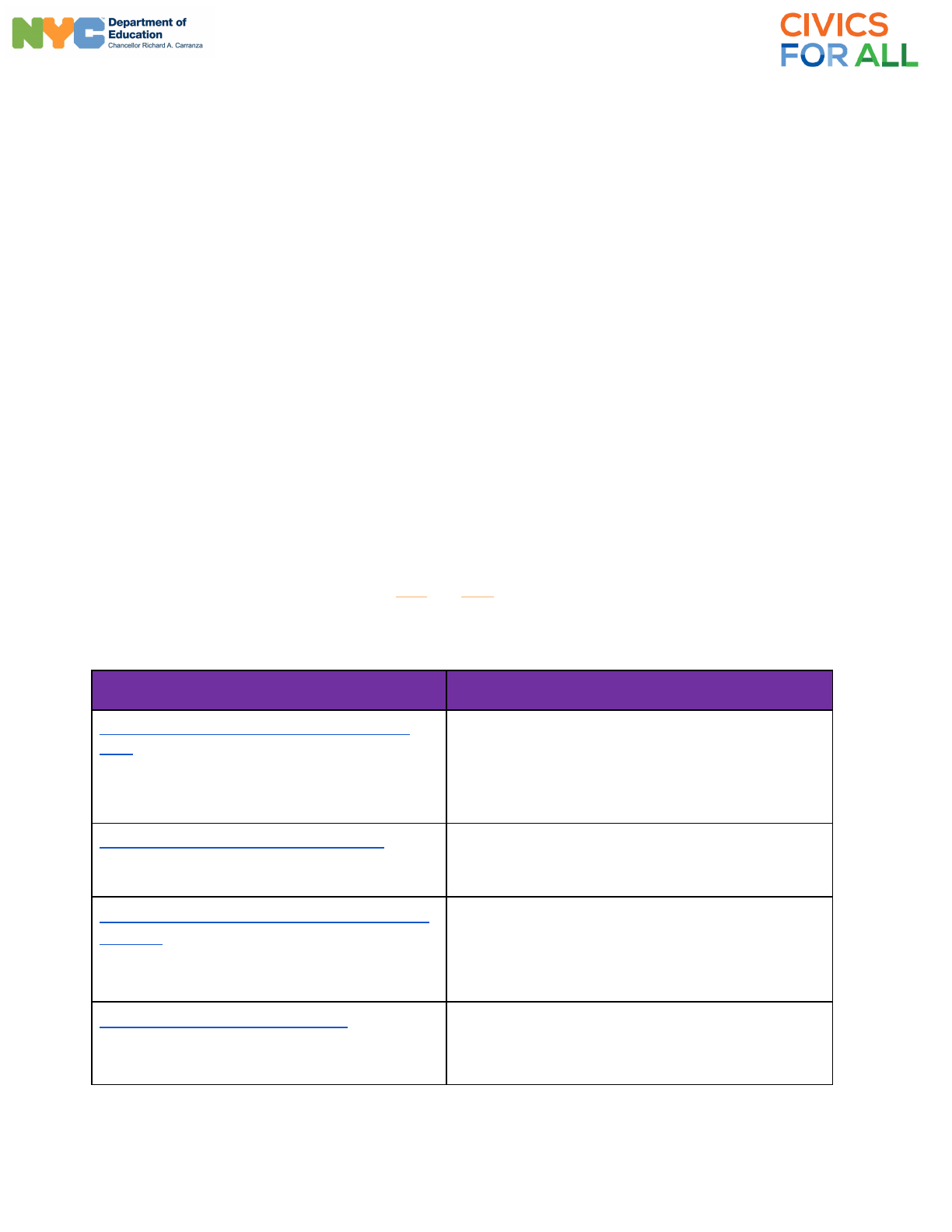
January 6th, 2021
Resource Guide
1
The Social Studies and Civics Department has compiled a resource list to support teachers in holding
conversations with their students following the insurrection at the United States Capitol on January 6,
2021. Our students are participants in our democracy, and it is important that they have an opportunity to
reflect on how this affects them.
Civics for All believes that civic education, particularly the teaching of the foundations of American
government and the democratic process, is essential for empowering engaged, active community
members and informed voters.
This guide is being compiled as events unfold and will be updated to include additional resources.
Included are teacher facing resources, student facing resources with focus questions and questions for
discussion, and links to relevant lessons from the NYCDOE Passport to Social Studies and Civics for All
curricula. Social Studies teachers are also encouraged to use primary source analysis strategies with
images and text from Washington, DC on January 6, 2021 to encourage students to begin and lead
classroom conversations. The events of January 6th may generate feelings of fear or anger in students. It is
important to create a space, whether in the physical classroom or using your remote learning platform, for
students to express discomfort and feelings of anger or distress that may emerge from discussing this
event. Facing History and Ourselves has resources on maintaining a student centered approach through
the virtual classroom, they can be accessed here and here.
Teacher Facing Resources
Resource
Summary
Mikva Challenge, Attack on the US Capitol Lesson
Ideas
Lesson plan ideas that provide students an opportunity to
share their reactions, thoughts, and feelings about the
events of January 6th in Washington, DC and make
connections to recent current and historical events in the
United States.
NYCDOE, Current Events and Civics Education
This resource provides guidance on the connection
between instructional practices, current issues and
events, and the civics classroom.
Constitution Center, A List of Electoral College Count
Resources
A list of statutes about the January 6th joint meeting of
Congress, sections of the Constitution related to the
Electoral College, and extensive resources from the
National Constitution Center about the Electoral College.
Facing History, Fostering Civil Discourse
A resource designed to help teachers prepare students to
engage in civil discourse, whether in-person, remotely, or
both.
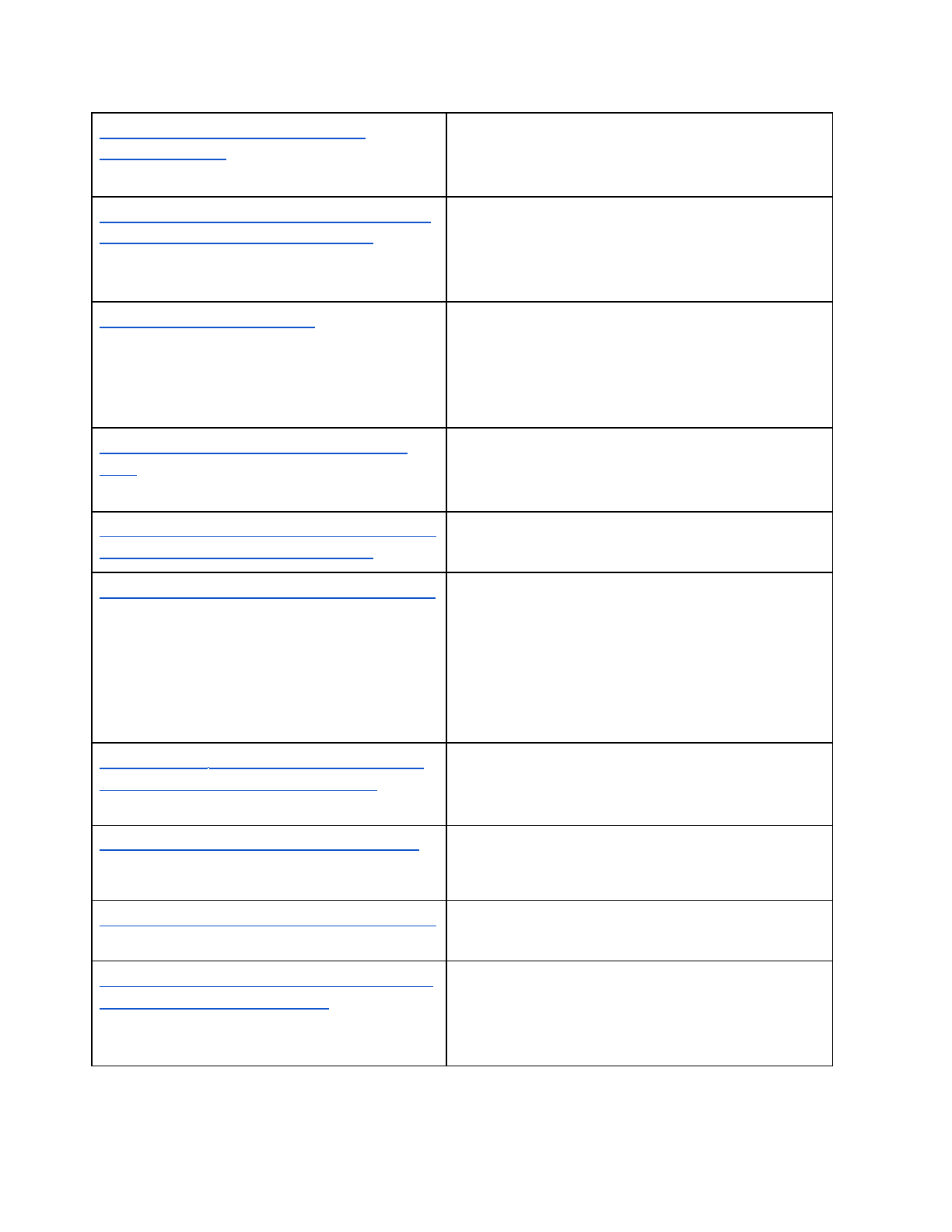
January 6, 2021 Guide
2
Facing History, Responding to the 2020 US
Presidential Election
Resources intended to guide student reflection on the
election of 2020.
Hechinger Report, OPINION: Our schools must figure
out a way to teach this presidential election
Op-Ed by Emma Humphries, chief education officer of
iCivics, which includes suggested practices for fostering
critical thinking and developing informed and thoughtful
citizens through discussions of controversial issues.
iCivics, Peaceful Transfer of Power
A lesson plan and infographic designed to show students
how precedent, tradition, and legitimacy have helped
create the democratic norm of the peaceful transfer of
power and why it is important to a democratic form of
government.
iCivics, Your Roadmap for Teaching Controversial
Issues
Teacher Guides and a series of brief informational videos
(3-4 minutes) to help prepare for teaching controversial
issues in the classroom.
KQED Learn, Are Conspiracy Theories Harmless Fun, A
Serious Problem, or Something in Between?
A video and Google Classroom lesson plan on identifying
misinformation.
National Constitution Center, Interactive Constitution
An interactive resource for looking at the text, history,
and meaning of the U.S. Constitution from leading
scholars of diverse legal and philosophical perspectives.
Teachers can provide this as a resource if the class needs
to access sections of the U.S. Constitution to discuss
events in Washington as they apply to Constitutional rules
and framing.
New York Times, Watch out for this misinformation
when Congress meets to certify the election.
Six false voter fraud claims that have been fact checked.
PBS Kids, Helping Kids Navigate Scary News Stories
An article for teachers and families that includes
suggestions on how to support lower elementary students
in processing disturbing events in the news.
Teaching Tolerance, When Bad Things Are Happening
An article for teachers on how to discuss crises with
students as they unfold.
UC Berkeley California History-Social Science Project,
Discord and Crisis: The 2020 Election
Resources from the webinar series on the 2020 Election
by UC Berkeley. Includes materials on Struggles Over
Suffrage and Threats to the Electoral Process.
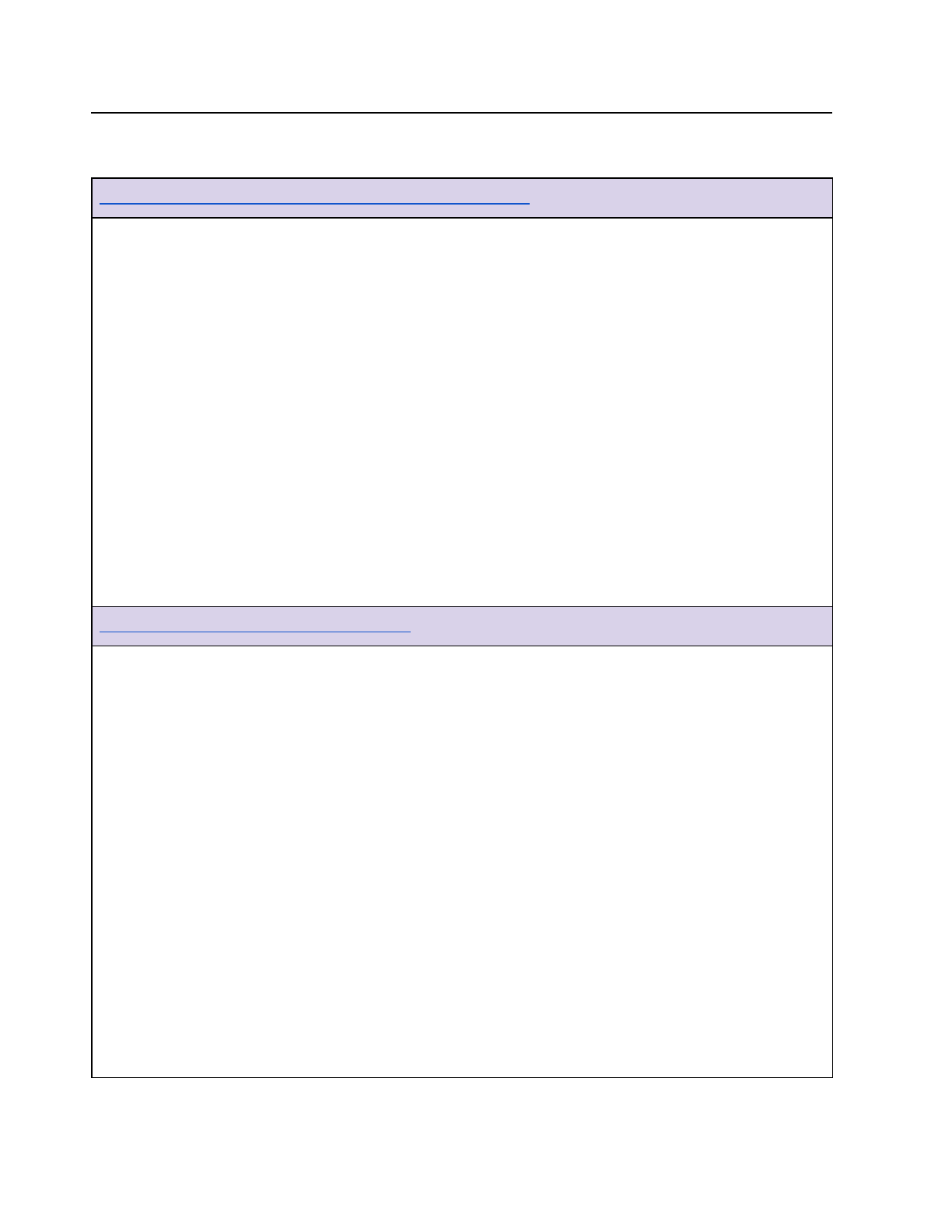
January 6, 2021 Guide
3
Student Facing Resources (with supporting focus and discussion questions)
Facing History, Explainer: Political Polarization in the United States
Description:
A one page resource designed to support students in understanding the evolution and impact of
polarization on our communities, families, and classrooms.
Focus Question for Political Polarization in the United States:
● What is political polarization, and is the United States becoming more polarized?
DIscussion Questions:
● What does political polarization look, sound, and feel like where you live?
● What causes polarization?
● What evidence does the infographic provide about political polarization that you believe to be the most
important? Why?
● What happened on January 6, 2021 in Washington D.C.?
● What questions do you have about what happened? Where can we look for answers to those questions?
● How did the events in Washington, D.C. on January 6, 2021 represent political polarization in the United
States?
● What should we do as a country in response to these events?
● How should students respond? Why?
Facing History, Explainer: Free and Fair Elections
Description:
A student facing resource that describes the standards that governments need to meet before,
during, and after an election to ensure that the election is "free and fair."
Focus Question for Free and Fair Elections:
● What does it mean for a nation to have a free and fair election?
Discussion Questions:
● What is the government’s role in holding free and fair elections?
● Why is the concept of one person, one vote central to free and fair elections?
● Why is it important to make sure that people are not intimidated during an election?
● What happened on January 6, 2021 in Washington, D.C.?
● What questions do you have about what happened? Where can we look for answers to those questions?
● Even though the election occurred in November, how did the events in Washington, D.C. on January 6,
2021 present a direct challenge to the concept of free and fair elections?
● How do the events in Washington, D.C. on January 6, 2021 create a challenge to a peaceful transfer of
power? Why is that a threat to free and fair elections?
● What should the media do to help ensure that future elections are free and fair?
● What can we do to ensure that future elections are free and fair?

January 6, 2021 Guide
4
Holocaust Encyclopedia, Beer Hall Putsch (Munich Putsch
)
Description:
An informational essay from the Holocaust Encyclopedia that provides background on the riot that led to the
coalenscence of the National Socialist Party in Germany. Includes discussion questions to help students
understand the significance of the event and draw connections to contemporary events. While it is important that
facile comparisons or historical analogy is avoided, the events in Washington, D.C. on January 6, 2021 can be
connected to events in 1923 and lessons from the past can be drawn so we do not forget the horrors of history.
Focus Question for Beer Hall Putsch (Munich Putsch):
Why should Americans in 2021 know about the events of the
Beer Hall Putsch?
Discussion Questions:
● What happened in Munich, Germany on November 8–9, 1923 that contributed to the rise of fascism in
Germany?
● If the overthrow of the government was unsuccessful, why was the Putsch a success for Hitler and the
Nazi party?
● What pressures and motivations affected the decisions of political and military leaders on all sides during
the Putsch crisis?
● Consider the usual penalties for treason for attempted overthrow of a government. What is the penalty
in your country? Why was Hitler’s sentence relatively light in comparison?
● What happened on January 6, 2021 in Washington, D.C.?
● What questions do you have about what happened? Where can we look for answers to those questions?
● What are the similarities that you see between the events in Munich, Germany on November 8–9, 1923
and what happened January 6, 2021 in Washington, D.C.? What are the differences? Why is it important
to think about the similarities and differences between these two events?
● Consider the events in Washington, D.C.on January 6, 2021 and what you know about the rise of fascism
in Germany. What lessons can we apply from the past to avoid these types of horrors?
● How should the government respond to what happened in Washington, D.C. on January 6, 2021?
● How should the American people respond?
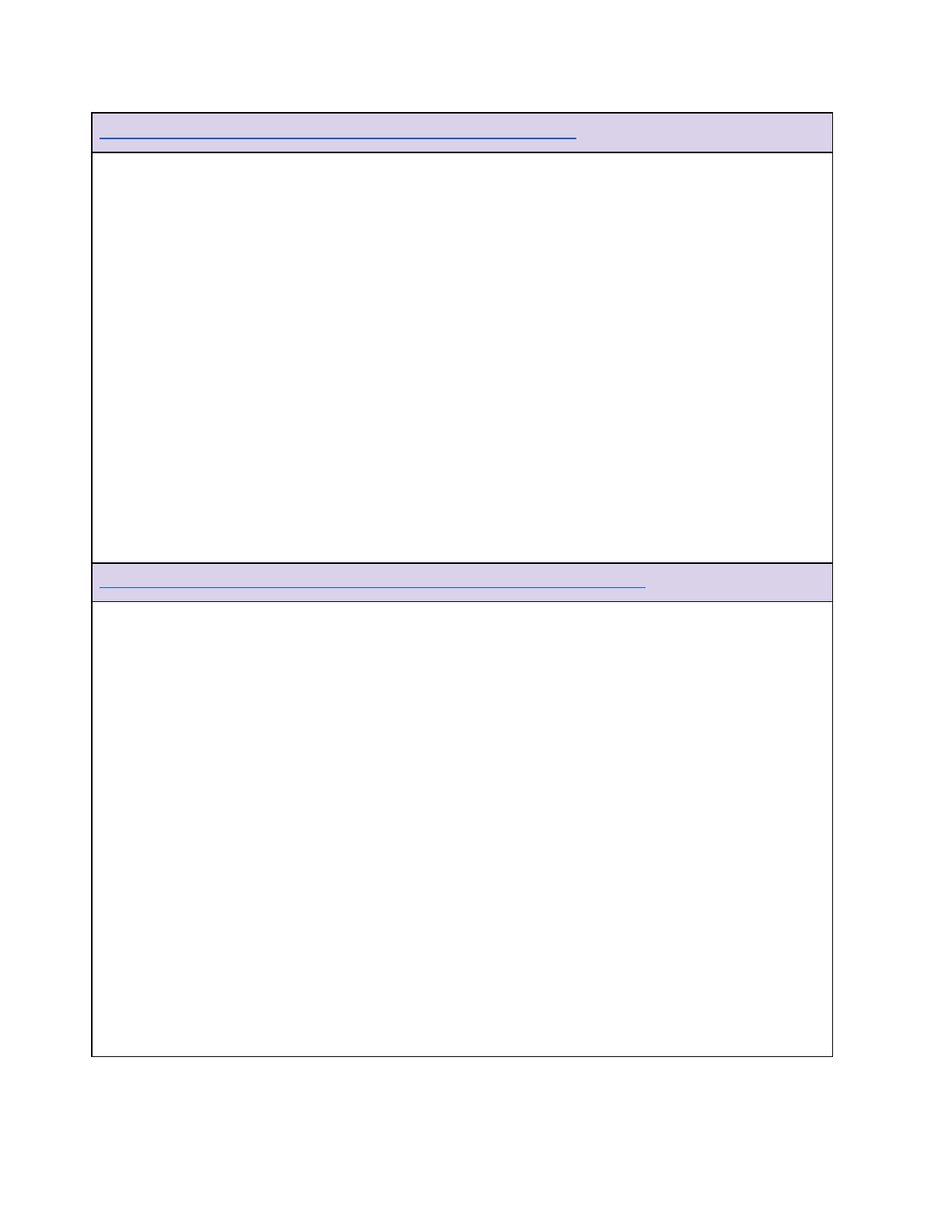
January 6, 2021 Guide
5
ITV, Trump Supporters Storm US Capitol Building As Protest Turns To Riots
Description:
Seven minute video from the British television station ITV. Provides a summary of the events with
narration from a reporter who was a witness to the riots at the U.S. Capitol. In addition to video of these events,
the broadcaster interviews participants and includes clips of speeches from elected officials. Please note that the
video does mention the shooting of one of the rioters.
Focus Question for Trump Supporters Storm US Capitol Building As Protests Turn To Riots:
What happened in
Washington, D.C. on January 6, 2021? Why did it happen?
Discussion Questions:
● What are you thinking about about the events in Washington, D.C.?
● What happened on January 6, 2021 in Washington, D.C.?
● What questions do you have about what happened? Where can we look for answers to those questions?
● How has the way that President Trump responded to the results of the November presidential election
influenced what happened at the U.S. Capitol on January 6, 2021?
● How did President-elect Joe Biden respond to these events?
● How should we respond to these events to ensure a more democratic path forward?
News Literacy Project, Practice Good Information Hygiene: Sanitize Before You Share
Description:
This resource was created to help students respond to the misinformation swirling around the
COVID-19 outbreak. However, the four-step process provides guidance for students on the importance of
consuming and sharing online content with care including information that is shared about the events in
Washington, D.C. on January 6, 2021.
Focus Question for Practice Good Information Hygiene: Sanitize Before You Share:
How can we practice good
information hygiene to ensure that the information we share is accurate?
Discussion Questions:
● What does accurate mean to you? What does credible mean to you?
● What are the four steps to sharing credible and accurate information?
● Why is it important that we share credible and accurate information?
● What happened on January 6, 2021 in Washington, D.C.?
● What questions do you have about what happened? Where can we look for answers to those questions?
● How did misinformation lead to these events?
● Why is it important that we make sure the information we share about January 6, 2021 is credible and
accurate?
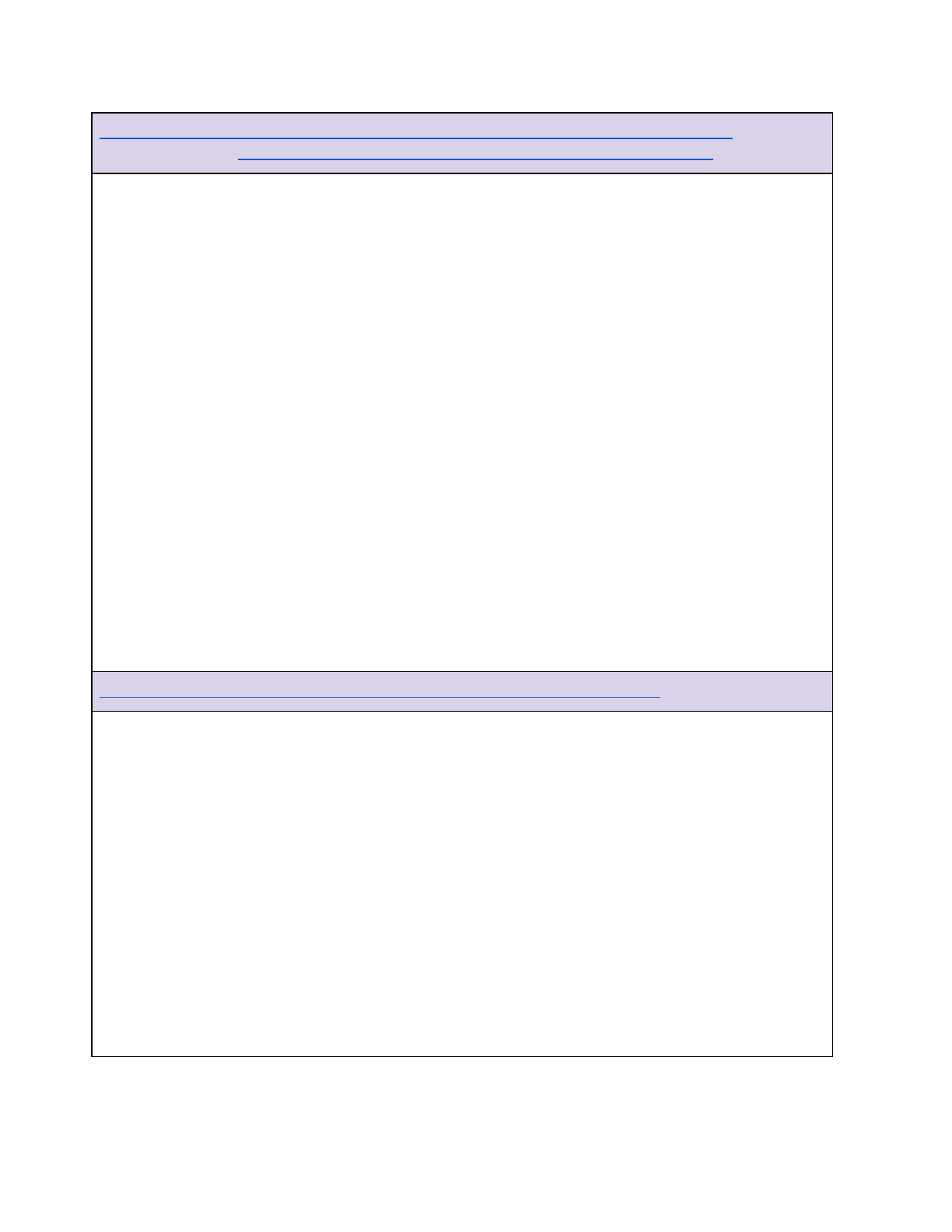
January 6, 2021 Guide
6
New York Times, Watch Out For This Misinformation When Congress Meets To Certify The Election
and Washington Post, Why January 6 Is A Key Date for Trump’s Election Dates
Description:
These two articles review the certification process scheduled to take place in the United States
Congress on January 6, 2021 as well as misconceptions and misinformation about the certification process.
Focus Question for the Election Certification Articles:
How does the United States Congress certify a presidential
election?
Discussion Questions:
● What is Congress's role in certifying a presidential election?
● What is supposed to happen if a member of the House of Representatives and Senator objects to a
state’s electoral college results?
● How might these objections delay the process?
● What false information was shared about the certification process before January 6, 2021? Why do you
think it was shared?
● Why have there been claims of fraud occurring in this past November’s presidential election? What
evidence is there to support these claims?
● Why do you think an insurrection occurred as the election was being certified?
● How should we respond to the misinformation about the November presidential election?
● How does this misinformation, and the subsequent events of January 6, 2021, challenge the goal of free
and fair elections in the United States? What should be done about this?
New York Times, Far-Right Groups Are Behind Most U.S. Terrorist Attacks, Report Finds
Description
: Article on the rise of White Supremacist violence and the recent Department of Homeland Security
report that concludes “that violent white supremacy was the ‘most persistent and lethal threat in the homeland.’”
Focus Question for Far-Right Groups Are Behind Most U.S. Terrorist Attacks:
How has the threat of white
supremacist terrorist groups grown in the last few years?
Discussion Questions:
● How has politics played a role in the growth of domestic terror groups?
● How did the news cover the attacks highlighted by the Center for Strategic and International Studies?
● Why do domestic terrorists attack people who are exercising their right to free speech?
● How does domestic terrorism challenge central values of American democracy?
● How can people try to stop the growth of terrorist groups?
● How might the pandemic be playing a role in the growth of hate groups?
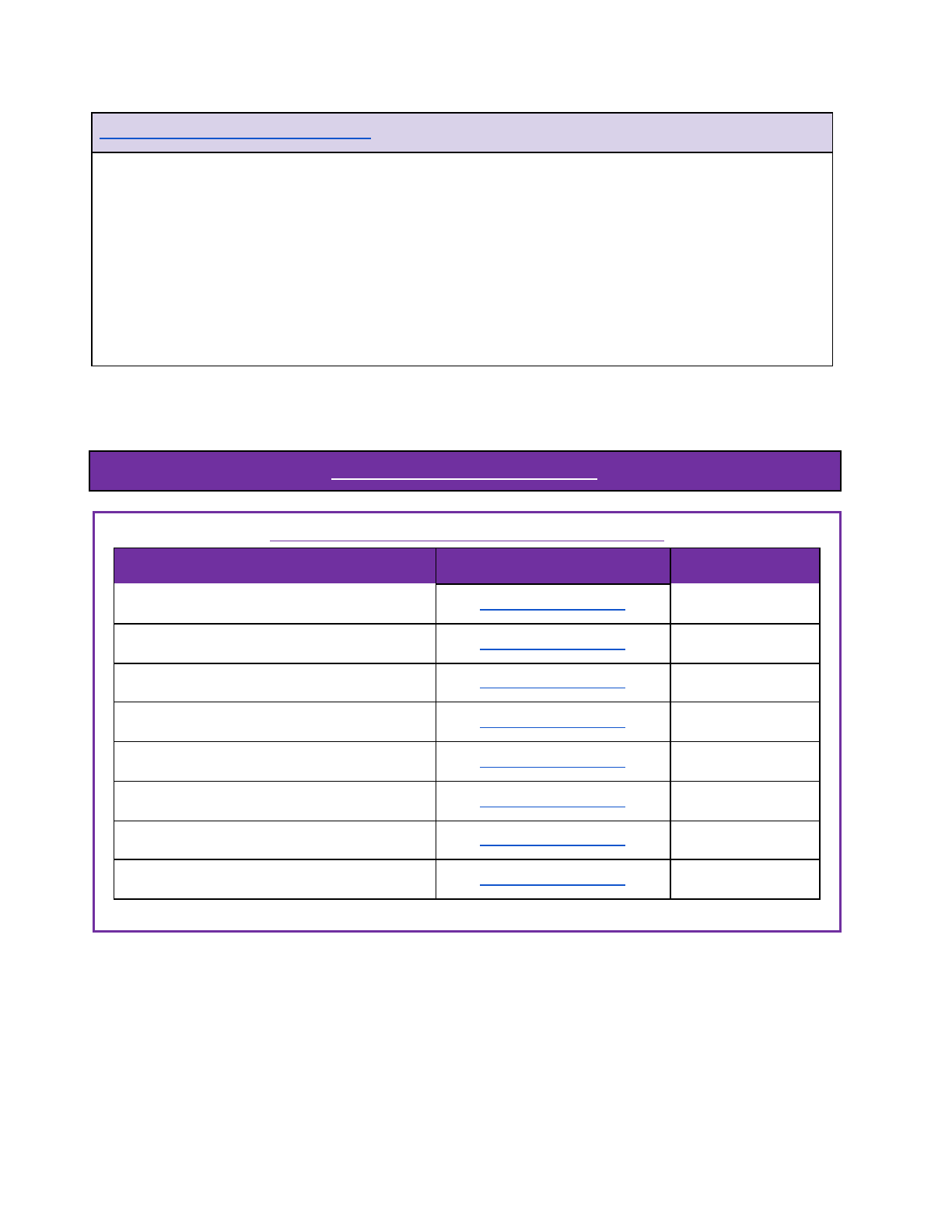
January 6, 2021 Guide
7
PBS Kids, When Something Scary Happens
Description:
Resources for use with young students in challenging times. This is a collection of various activities
and videos for younger students to help them deal with emergencies and crisis situations.
Focus Question for When Something Scary Happens:
Who do we look to for help in a crisis?
Discussion Questions:
● Why is it important to tell people how you feel when you are worried or scared?
● Who would you look to for help in an emergency?
● How can you help others in a crisis?
Civics for All Curriculum Resources
Grades K–2: Civics for All Curriculum Guide Lessons
Lesson
Link
Page Number
Core American Values
Civics for All: K-2 Part 1
Page 107
Purpose of Rules and Laws
Civics for All: K-2 Part 1
Page 167
What is Democracy?
Civics for All: K-2 Part 2
Page 12
Leaders’ Roles and Responsibilities
Civics for All: K-2 Part 2
Page 23
Electing our Leaders
Civics for All: K-2 Part 2
Page 44
Where Our Leaders Live
Civics for All: K-2 Part 2
Page 69
Our Branches of Government
Civics for All: K-2 Part 2
Page 78
Fostering Civil Discourse
Civics for All: K-2 Part 2
Page 203

January 6, 2021 Guide
8
Grades 3–5: Civics for All Curriculum Guide Lessons
Grades 6–8: Civics for All Curriculum Guide Lessons
Lesson
Link
Page Number
Negotiating, Compromising, and Respecting
Views
Civics for All: 3-5 Part 1
Page 37
American Ideals
Civics for All: 3-5 Part 1
Page 58
Participation as Civic Ideal
Civics for All: 3-5 Part 1
Page 212
The Constitution
Civics for All: 3-5 Part 2
Page 46
Power and Use of Power to Influence
Civics for All: 3-5 Part 2
Page 90
Active Political Participation
Civics for All: 3-5 Part 2
Page 145
Lesson
Link
Page Number
Structural Overview of the U.S. Constitution
Civics for All: 6-8 Part 1
Page 121
The Executive Branch
Civics for All: 6-8 Part 1
Page 128
Project: Time Capsule
Civics for All: 6-8 Part 1
Page 193
Rights and Responsibilities of the Press
Civics for All: 6-8 Part 1
Page 250
Project: Current Events Newsletter
Civics for All: 6-8 Part 1
Page 285
A Just Society
Civics for All: 6-8 Part 2
Page 149
Democratic and Republican Party Platforms
Civics for All: 6-8 Part 2
Page 181
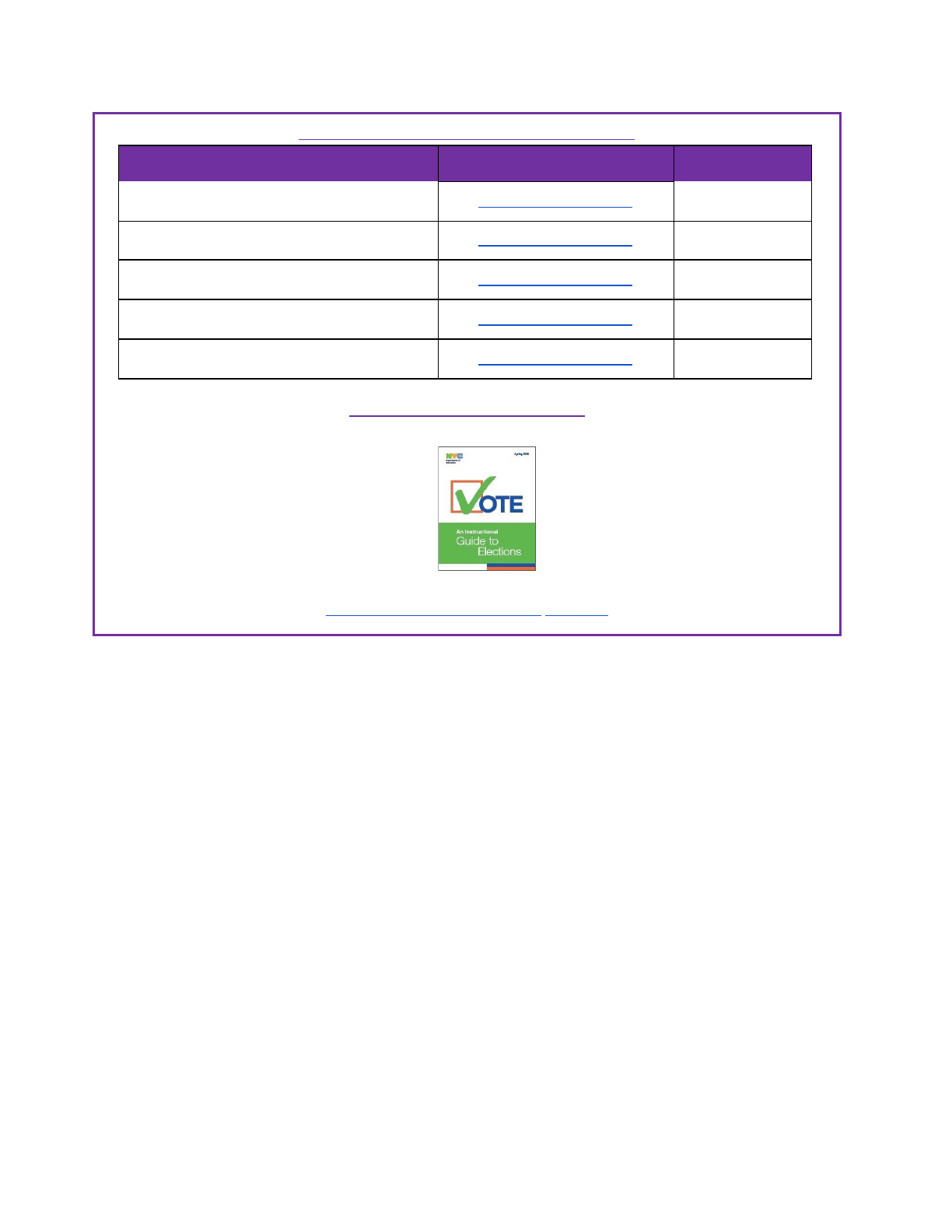
January 6, 2021 Guide
9
Grades 9–12: Civics for All Curriculum Guide Lessons
Grades 9–12: Civics for All Resources
Vote: An Instructional Guide to Elections
Lesson
Link
Page Number
The Individual in a Representative Democracy
Civics for All: 9-12 Part 1
Page 96
Digital Citizenship and Fact Checking
Civics for All: 9-12 Part 1
Page 130
What is Politics?
Civics for All: 9-12 Part 2
Page 7
The Use of Media in a Political Campaign
Civics for All: 9-12 Part 2
Page 93
Civil Political Discourse
Civics for All: 9-12 Part 2
Page 139
